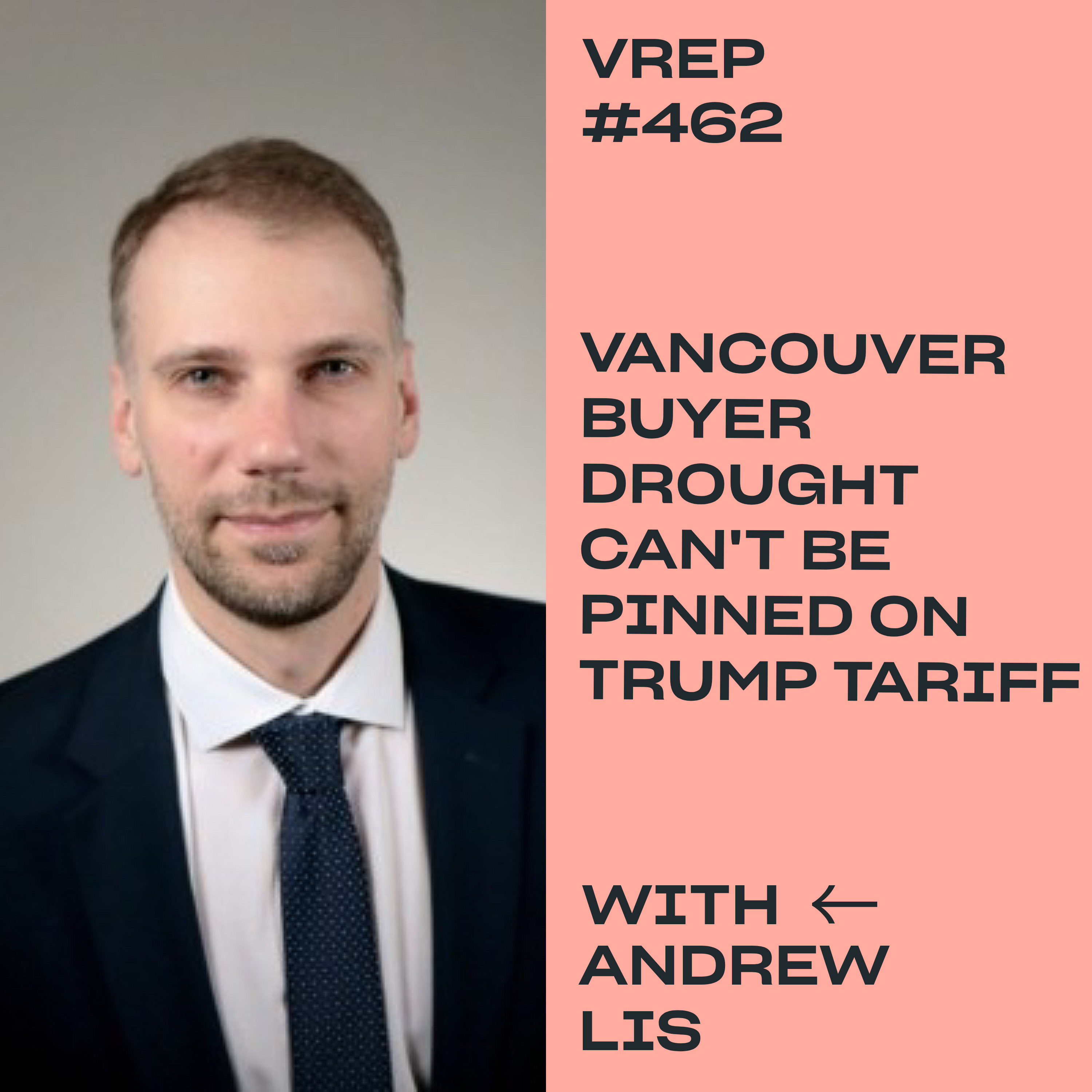Episode 324 – May 27, 2022
Listen On: Apple Podcasts | Spotify | Google Podcasts | YouTube
As the real estate market softens throughout Greater Vancouver, many are wondering what this means for new construction and the presale market in Vancouver. MLA Canada’s President, Ryan Lalonde, and Executive Director, Cameron McNeill, join Matt & Adam in studio to discuss the health of the presale market, where to find the deals in the coming months, and the pressures that will drive prices even higher. Does the presale market mirror the resale market? Will interest rate spikes lead to price reductions? And how do real estate downturns CRUSH supply and inevitably lead to demand shocks.
Listen to Episode
Guest Information

Ryan Lalonde
Ryan Lalonde is the President and a Partner at MLA Canada. As a strategist and industry influencer, Ryan Lalonde creates innovative ways for clients to connect with homebuyers in leading MLA’s data technology division. Driven by a passion for delivering excellence at every turn, he partners with expert teams at MLA to build dynamic sales programs with impactful brand awareness. Working alongside some of Canada’s most noteworthy development partners, Ryan has stewarded some of the largest multifamily mixed-use development sites in Canada. His fearless disruption of the status quo translates into forward-thinking solutions that benefit industry leaders and the wider community. He is a board member of Fintech and Proptech and actively advocates on behalf of BC Children’s Hospital and World Housing initiatives to end global homelessness.

Cameron McNeill
Cameron McNeill is an Executive Director and Partner at MLA Canada. A forerunner in the real estate development industry, Cameron McNeill brings unparalleled insight and fortitude to his clients and the broader industry at large. His dedication to mission-aligned client relationships has been key to MLA’s rapid ascension. As Executive Director and Partner, he has delivered intelligent expansion and success to some of the most prolific projects across Canada. Cameron is forever advancing product development and modernizing the tech stack while applying a customer-focused approach to sales and a hands-on approach to client partnerships. His passion for sales and marketing is expressed creatively and cleverly, with thoughtful mentorship and optimism further galvanizing MLA’s progressive company culture.
Episode Summary
Who is Ryan Lalonde?
I’m the President of MLA Canada and work closely with Cameron. We’re responsible for overseeing the work we do on multi-family projects in BC. We want to add value across every aspect of the development life cycle. We also have advisory services with a national perspective.
Who is Cameron McNeill?
Ryan and I came together six years ago and I’ve personally been in this space for 30 years. It’s exciting to be close to the development industry through project management.
How’s the presale home market in BC right now?
When we last spoke, everything was heading in the upward direction for presales and resales. It was a frothy time, though we had low supply. We simply couldn’t keep up. Today, more of those variables are shifting. There are dark clouds on the horizon. There’s inflation, geo-political issues, a low stock market, a ban on foreign buyers and more negativity. But that doesn’t take away from our strong market fundamentals for the long term.
In the past, it seems that the presale market is busy when the resale market is soft and vice versa. How are the presale market and the resale market connected right now?
We pay close attention to both the resale and presale markets throughout BC. Covid has changed shifts in demand and demographics, which is changing supply in existing markets. Traditionally, the presale and resale markets ebbed and flowed at different times. Now, the resale market has been on fire for the last 36 months. And we’ve seen record price escalation. There’s so much demand for very limited inventory.
Because access to resale inventory was so difficult, many home buyers shifted to presale. If you keep missing out on multiple offers, you may turn to something more easy to obtain. So that’s pushed up demand in presale.
But interest rates are changing that story. Recently, we’ve seen a pullback of 25-35% in resale sales and an increase in listings from 10-20%. That softening will continue and impact the demand for presale.
We’ve been saying it’s going to take more to do less in sales. Every moment, you have to be thoughtful. You have to lean into customers and figure out what value needs to be delivered.
There seems to be a lot of uncertainty in the market. Why would someone want to buy in the BC housing market today?
Despite the uncertainty, we do have currents working in the right direction. We are expecting 1.3 million new Canadians in the next three years. But we can’t provide enough housing – both rental and homeownership – for everyone. Those immigration numbers are only going to continue to grow.
We have a strong economy here in Canada. It will be interesting to see how we manage inflation and if we head into a recession. Energy and oil are big industries for Canada. Vancouver can’t be seen in isolation.
We can’t forget that we’re a small city on a global scale. Immigration into Canada is quite friendly and everyone wants to live here. So it’s not going to be cheaper to buy a home in Vancouver three years from now.
Interest rates have gone up but they are still very low. Rental rates on new product are up 20% from what they were 18 months ago. They are record high.
Real estate is not the same as day trading. You can’t time it perfectly and every piece of real estate is unique. If you find something that fits your needs, you should be thinking long term, 3-5+ years. You can have great confidence in the Vancouver housing market for the medium to long term.
Keep your finger on the pulse of Vancouver’s real estate market with our Live Wire email newsletter.
There is a lot of concern around carrying costs for home buyers. Is that an issue?
You have to consider the stress test. That buffer allows us to grow with an increasing interest rate and still be protected. Canadians are protected.
But there is that strong current of demand. And there’s also rising construction costs due to supply chain issues.
Tell us more about increasing supply costs and how that affects pricing in the housing market.
In the last two months, we’ve seen 20-30% increases in supply costs. We can assume some of those costs will come back down but some won’t, such as labour. So some development companies will choose to stop bringing homes to the market because the numbers just don’t make sense. Some companies that were looking to deliver rentals won’t be able to do that anymore.
So housing supply will shift. We released just over 20,000 presale units in 2021. If rising costs continue to hold, inventory will drop considerably. And those access challenges will cause prices to increase, on top of their increase due to building costs.
The presale market can’t swing too far backwards. It’s hard to imagine how any markets will be cheaper in the future. With low inventory, strong immigration, and higher costs of construction, prices have to push up to get these projects to market.
Stability is what we all hope for. It allows the development industry to bring product to market confidently. When different levels of government try to play with demand, that doesn’t change the liveability of our region. Those forces continue to be here.
How do rental prices factor into the housing market?
Rental stock is a big part of the story that can’t be underestimated. We need 20,000 vacant units just to give us 1.5% vacancy. We currently have 0% vacancy so rental prices are pushing up. We will continue to see that upward pressure until the gap between rental and purchase prices closes again.
We’re not building enough. And if supply is further restricted going forward, now might be the time to make some concentrated bets.
How have building materials and timelines on projects been affected?
When we ask when is the appropriate time to launch, the answer is tied to costs. We simply can’t get access to the materials we need to build.
If you pre-sell today believing construction costs will increase 5-10% per year, but they jump up to 25%, you’re in trouble. Homebuilders need to understand their costs so they know what they can sell homes for.
With current timelines, it’s a minimum of 5.5 years from today to deliver keys to the purchaser. We keep kicking the ball down the road but we don’t have enough housing. Governments are not making the decisions needed to create significant long term changes.
You have to think 36-48 months out if you’re a homebuyer. Inventory will be negatively affected in the years to come. We’re on track for the worst supply shortage in a long time. It’s tough to track exactly what the numbers will be because people leave the area when there’s no supply.
Keep your finger on the pulse of Vancouver’s real estate market with our Live Wire email newsletter.
Are there deals to be had in the BC housing market? Is now a good time to buy a home in BC?
2021 and 2022 have been banner years for transactions in both presale and resale markets. That was influenced by covid and low interest rates, but also by 2019. The number of housing starts that began in 2019 has impacted the housing available today, because we’re on a 2-3 year building timeframe.
We’re now feeling the run up of a lack of inventory. The issue is we didn’t start building things in 2019 and 2020. So we’re experiencing the consequences of that today.
Developers who purchased land in the last 18 months when costs were on the rise may have to press pause. They need more certainty before they can get started. So that will cause fewer housing project starts, resulting in lower inventory in the future.
In 2018, we had 159 project launches. In 2017, we saw over 200. In 2021, there were only 131. We’re not keeping up. And we will feel that inventory consequence two to three years from now.
Will presale prices drop?
More likely than not, prices can’t drop on presale. It’s hard to imagine how prices will come off. Due to the lack of inventory, prices are only going up. The best time is now but it will likely be flat over the next 6-12 months.
For developers, it’s all about a presale test. The first 60% will be about getting a shovel in the ground. The remaining 40% will be about getting value and covering costs.
How do we get the housing inventory we need in Vancouver?
The water is always flowing. Once the pressure builds up, the dam overflows and things reset. It’d be a healthier housing market if there was a steady flow but we do have these factors that add upward pressure.
Vancouver stands out on a global scale. The only way to increase affordability is to make Vancouver less terrific. But that’s not going to happen.
We’ve seen in Vancouver momentary pauses, like after the policy changes in 2016 and 2018, followed by rampant run-up in prices and activity. We are likely in that moment in the near term. But because the cause is different this time, many home builders will have to decide if they are going to release product.
They have to bet on how terrific Vancouver is and if the policymakers get it right or not.
There are a lot of nostalgic people here in Vancouver who don’t want to see the city change. Finally, headlines and politicians are acknowledging that supply is a problem. But words are easy. The shift we need is going to take years. If we don’t accept that we need to build significantly denser communities, we’re going to run into a big problem of how we house British Columbians.
What product types and submarkets in the Lower Mainland are performing well in 2022 and into 2023?
We like things that are differentiated. Products focused on the end-user, like townhouse product, will do well. We’re seeing a record number of people moving further east to get more space.
On the concrete side with longer timelines and higher prices to deliver, things may be less hot. Commodity real estate may be disrupted in the short term but should pay off in the long term.
Homes that are going to do the best from an investment standpoint are the ones you can afford to manage, and ones that are at the intersection of affordability and income. Many people shifted during covid to move further east. Now, people are confident that this shift is here to stay and we may see more movement to secondary markets, like the Okanagan.
Thoughtful real estate will continue to be the priority. Townhouses and products that offer something unique to the end-user are key. Those 300 square foot studios in Kelowna will be harder and harder to sell.
There will be different needs for different people. Some people will choose Vancouver and others will choose Kelowna. We don’t believe violent market swings are afoot anymore. There’s been a shift in demographics, work and lifestyles.
Most of these “secondary centres” are growing because of people leaving Vancouver. And Vancouver is growing because of people coming in from outside of Canada. Small towns across BC are seeing incredible growth and, just like the big cities, suffering from lack of inventory.
Keep your finger on the pulse of Vancouver’s real estate market with our Live Wire email newsletter.
Episode Host

Adam Scalena
Adam is a full-service realtor, specializing in Vancouver’s best areas. His systematic approach to real estate and dedication to his clients has consistently placed him within the top 10% of realtors operating within Greater Vancouver.

Matt Scalena
Matt is real estate obsessed and considers himself a lifelong student of the Vancouver real estate market. As a co-manager of the Scalena Real Estate team, Matt prides himself on expertly advising buyers and sellers on all aspects of the fast-paced, dynamic Vancouver real estate market. He is present at every stage of the process, from that first phone call or email right through to when keys are exchanged between sellers and buyers.







